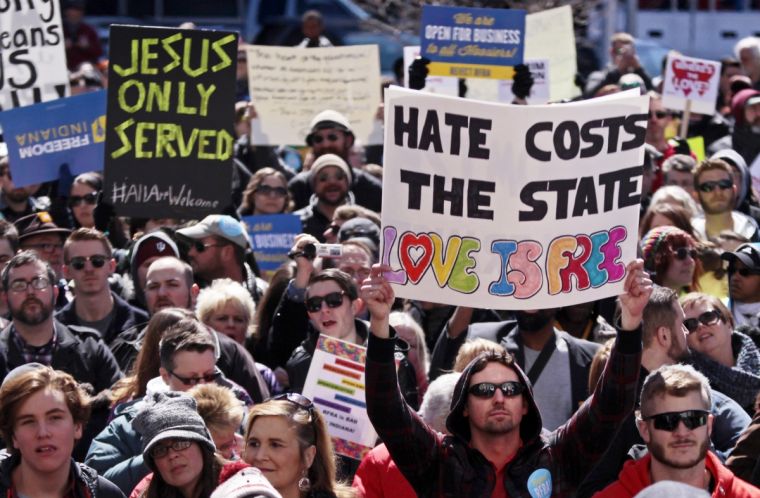Victory at last for Christian florists and bakers? Trump set to sign religious liberty executive order

Donald Trump has invited conservative and faith leaders to the White House tomorrow, the National Day of Prayer, and is expected to sign the long-awaited executive order on religious liberty.
According to Politico, lawyers are still fine tuning the order's wording, but multiple sources confirmed the plan.
If enacted, the religious freedom executive order is a major piece of payback to evangelical Christians and other religious conservatives from Trump, alongside the appointment of the conservative judge Neil Gorsuch to the Supreme Court.
It follows disappointment among religious conservatives over the recent budget, which failed to de-fund Planned Parenthood.
Trump knows that he is appealing to the Christian right – both evangelicals and white Catholics – who helped propel him into office.
The proposed order, which is said to contain 'very, very strong' language, is highly controversial.
In February, the left-wing paper The Nation obtained a leaked draft, which legal experts and LGBT campaigners condemned as 'unconstitutional' and 'un-American'.
The leaked four-page draft sought to overturn a wide range of anti-discrimination protection for minorities; it delighted conservative evangelicals and outrage liberals in equal measure.
If enacted, the document would create wholesale exemptions for people and organisations who claim religious or moral objections to same-sex marriage, premarital sex, abortion, and transgender identity, and it seeks to curtail women's access to contraception and abortion through the Affordable Care Act.
The draft sought specifically to protect the tax-exempt status of any organisation that 'believes, speaks, or acts (or declines to act) in accordance with the belief that marriage is or should be recognised as the union of one man and one woman, sexual relations are properly reserved for such a marriage, male and female and their equivalents refer to an individual's immutable biological sex as objectively determined by anatomy, physiology, or genetics at or before birth, and that human life begins at conception and merits protection at all stages of life'.
Politico said the signing of such an order 'would represent a major triumph for [committed Christian] Vice President Mike Pence –whose push for religious-freedom legislation backfired mightily when he served as governor of Indiana –and his allies in the conservative movement'.
The website reported that after the leak to The Nation, 'Pence and a small team of conservative allies quickly began working behind the scenes to revise the language, and in recent weeks have ratcheted up the pressure on Trump to sign it. The new draft is being tightly held, but one influential conservative who saw the text said it hasn't been dialed back much – if at all – since the February leak. "The language is very, very strong," the source said.'
However, another theory is that the draft was leaked to The Nation in order to draw the sting out of liberal critics in advance of its signing.
The Christian right was slow to react to the draft, careful, perhaps, not to show glee and further infuriate the liberal left in the face of such controversial policies. For some, it may be a case of 'too good to be true'.
By all accounts, Trump's own tactics when it comes to making 'deals' is to start with an extreme position and work back.
In other words, the leaked version may be harder than a more diluted order actually signed by the president in due course.
The executive order will follow a series of high-profile religious freedom cases.
In February, the Washington Supreme Court ruled unanimously that a florist who refused to provide services for a same-sex wedding broke the state's anti-discrimination law, even though she claimed that doing so would violate her religious beliefs.
Barronelle Stutzman, a florist in Richland, Washington, had been fined by a lower court for denying assistance to a gay couple in 2013.
Stutzman said she was exercising her First Amendment rights, but the court held that her floral arrangements do not constitute protected free speech, and that providing flowers to a same-sex wedding would not serve as an endorsement of same-sex marriage.
Another case involves that of Charlie Craig and David Mullins, who in July 2012 went to Masterpiece Cakeshop, a small bakery in Lakewood, Colorado, to order a cake for their wedding reception. The owner, Jack Phillips, told them that he would happily provide baked goods for them for other occasions, but he would not create a cake for this event, citing his religious convictions. As The New Yorker reported in March, a decision on the case was delayed by the Supreme Court.
If the executive order is anything like the leaked version, it will surely be hit by a blizzard of fresh court cases that will stop it in its tracks, as has been the case with the Muslim travel ban.
Perhaps, though, this is what Trump wants, so he can portray himself as doing battle with liberals.
Maybe, though, he actually believes in pushing such legislation through, and is relying on Gorsuch, newly appointed to the Supreme Court, to back him up.
So far, the administration has closely guarded details of the re-written executive order. But if the reports are accurate, we will know much more tomorrow, when the real battle is likely to begin.











